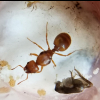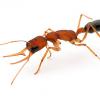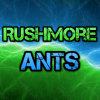- Formiculture.com
- Forums
- Gallery
- Members
- Member Map
- Chat

My ants are randomly dying
Started By
Alacom
, May 15 2020 12:44 AM
24 replies to this topic
#1
 Offline
-
Posted May 15 2020 - 12:44 AM
Offline
-
Posted May 15 2020 - 12:44 AM
So a few days ago I moved my liometopum Occidentale colony into an AAC nest that had been in their outworld (by force since they hadn’t moved into it even after 2 months). I’m seeing dead bodies accumulate within the nest and I don’t know why. I’m worried since I previously had a tetramorium colony that randomly died in that nest as well, but I cleaned it out well before I gave it to my current colony. Any idea why this is happening?
- jushi likes this
#2
 Offline
-
Posted May 15 2020 - 12:57 AM
Offline
-
Posted May 15 2020 - 12:57 AM
Many things can cause it. Bad nest, bad food, bad heat/humidity, etc. Could also just be stress from moving.
Also, genus name is capitalized and species is lowercase (Liometopum occidentale).
- FSTP and jushi like this
#3
 Offline
-
Posted May 15 2020 - 3:39 AM
Offline
-
Posted May 15 2020 - 3:39 AM
AC stuff is cursed.
Edited by Antkid12, May 15 2020 - 3:40 AM.
Ants I have: Tapinoma sessile(2 queen colony). RED MORPH Camponotus neacticus(now has pupae!), Tetramorium immigrans (x3), Aphaenogaster sp, Temnothorax sp, Brachymyrmex sp. possibly infertile ![]() , Ponera pennsylvanica, and Pheidole morrisi!
, Ponera pennsylvanica, and Pheidole morrisi! ![]()
Other insects: Polistes sp. Queen
Ants I need: Pheidole sp., Trachymyrmex sp., Crematogaster cerasi , Dorymyrmex sp. Most wanted: Pheidole morrisii
#4
 Offline
-
Posted May 15 2020 - 4:09 AM
Offline
-
Posted May 15 2020 - 4:09 AM
AC stuff is cursed.
He said AAC, as in Autoclaved Aerated Concrete (or, as it's commonly known, Ytong), not AC, as in Ants Canada. Simple mistake, nothing to worry about.
- jushi likes this
#5
 Offline
-
Posted May 15 2020 - 4:50 AM
Offline
-
Posted May 15 2020 - 4:50 AM
Most ants don’t think these formicariums we make are as wonderful as we humans do. If the colony is doing well in a test tube, I would leave them in there.
- Temperateants and jushi like this
"The ants are a people not strong, yet they prepare their meat in the summer." Prov. 30:25
Keep ordinary ants in extraordinary ways.
Keep ordinary ants in extraordinary ways.
#6
 Offline
-
Posted May 15 2020 - 4:54 AM
Offline
-
Posted May 15 2020 - 4:54 AM
Can you further describe your problem?
Unless something with disease or toxins in going on, not much can cause Tetramorium to randomly die. I've lost a tetramorium colony like in your case. I think it is because of dehydration. At first, workers started dying. Then, they stopped taking food. The final sign that something was horribly wrong was when callows started dying. That can all be explained. Workers don't get enough water, they die. Brood is less healthy and the queen stops laying, so food consumption plummets which causes more death. Finally. callows either die because of not enough water or deformities in the pupae stage. I've almost lost another tetramorium colony with the same signs, but I quickly moved them to a new tube and they are eating and doing better than ever.
- jushi likes this
Check out my Youtube Channel! https://www.youtube....xh-HaScAuE5CShQ
Check out my Crematogaster Journal! https://www.formicul...e-2#entry141180
#7
 Offline
-
Posted May 15 2020 - 5:16 AM
Offline
-
Posted May 15 2020 - 5:16 AM
Can you further describe your problem?
Unless something with disease or toxins in going on, not much can cause Tetramorium to randomly die. I've lost a tetramorium colony like in your case. I think it is because of dehydration. At first, workers started dying. Then, they stopped taking food. The final sign that something was horribly wrong was when callows started dying. That can all be explained. Workers don't get enough water, they die. Brood is less healthy and the queen stops laying, so food consumption plummets which causes more death. Finally. callows either die because of not enough water or deformities in the pupae stage. I've almost lost another tetramorium colony with the same signs, but I quickly moved them to a new tube and they are eating and doing better than ever.
The testing that they were previously in didn’t contain moisture, as it’s water supply had ran out a while ago but they seemed to be doing fine since they had sugar water to drink. When the tetramorium were in the nest, I would hydrate it regularly and the only possible thing I could think of for them dying randomly was some bacteria in the sand I gave them. But I completely cleaned out the tank and put sterile soil in there for the Liometopum. The only thing that changed was them moving into the nest (which I hydrated).
#8
 Offline
-
Posted May 15 2020 - 5:19 AM
Offline
-
Posted May 15 2020 - 5:19 AM
I had a similar problem with a homemade nest I got. First I moved a Camponotus pennsylvanicus colony into it, and they mysteriously died. Then I moved a Prenolepis imparis colony into it as well (after a thorough cleaning of course), and they also died. So my conclusion is that there's something about that nest.......
"God made..... all the creatures that move along the ground according to their kinds (including ants). And God saw that it was good. Genesis 1:25 NIV version
Keeping:
Tetramorium immigrans Camponotus vicinus, modoc, novaeboracensis, herculeanus
Formica pallidefulva, argentea Solenopsis molesta
Formica cf. aserva Lasius brevicornis, neoniger
#9
 Offline
-
Posted May 15 2020 - 5:22 AM
Offline
-
Posted May 15 2020 - 5:22 AM
Literally 50 of them died within 2 days of being in the nest.
#10
 Offline
-
Posted May 15 2020 - 5:24 AM
Offline
-
Posted May 15 2020 - 5:24 AM
Can you further describe your problem?
Unless something with disease or toxins in going on, not much can cause Tetramorium to randomly die. I've lost a tetramorium colony like in your case. I think it is because of dehydration. At first, workers started dying. Then, they stopped taking food. The final sign that something was horribly wrong was when callows started dying. That can all be explained. Workers don't get enough water, they die. Brood is less healthy and the queen stops laying, so food consumption plummets which causes more death. Finally. callows either die because of not enough water or deformities in the pupae stage. I've almost lost another tetramorium colony with the same signs, but I quickly moved them to a new tube and they are eating and doing better than ever.
The testing that they were previously in didn’t contain moisture, as it’s water supply had ran out a while ago but they seemed to be doing fine since they had sugar water to drink. When the tetramorium were in the nest, I would hydrate it regularly and the only possible thing I could think of for them dying randomly was some bacteria in the sand I gave them. But I completely cleaned out the tank and put sterile soil in there for the Liometopum. The only thing that changed was them moving into the nest (which I hydrated).
There's your problem. Brood needs ACTUAL moisture. The ants need pure water, not just sugar water. For test tubes, I've always moved Camponotous by force from one test tube to another with no adverse effects, since each test tube has the same conditions, but there is no doubt something wrong with the nest if they didn't like it enough to move into it naturally. And what is the tank? Is it an outworld? Can you fully describe your setup?
Check out my Youtube Channel! https://www.youtube....xh-HaScAuE5CShQ
Check out my Crematogaster Journal! https://www.formicul...e-2#entry141180
#11
 Offline
-
Posted May 15 2020 - 5:26 AM
Offline
-
Posted May 15 2020 - 5:26 AM
It’s an outworld all in one formicarium with an AAC nest buried about halfway into the sterile soil. I supply them with freeze dried crickets that I let soak in water for a while to soften them up. The thing that confused me is that the tetramorium moved willingly into the nest.
#12
 Offline
-
Posted May 15 2020 - 5:27 AM
Offline
-
Posted May 15 2020 - 5:27 AM
tetramorium moved willingly into the nest.
Tetramorium will move into anything.
- jushi likes this
"God made..... all the creatures that move along the ground according to their kinds (including ants). And God saw that it was good. Genesis 1:25 NIV version
Keeping:
Tetramorium immigrans Camponotus vicinus, modoc, novaeboracensis, herculeanus
Formica pallidefulva, argentea Solenopsis molesta
Formica cf. aserva Lasius brevicornis, neoniger
#13
 Offline
-
Posted May 15 2020 - 5:30 AM
Offline
-
Posted May 15 2020 - 5:30 AM
How much moisture did you give them? Did you give them enough heat, or too much? How did the ants die?
Check out my Youtube Channel! https://www.youtube....xh-HaScAuE5CShQ
Check out my Crematogaster Journal! https://www.formicul...e-2#entry141180
#14
 Offline
-
Posted May 15 2020 - 5:31 AM
Offline
-
Posted May 15 2020 - 5:31 AM
The test tube that they were in just 2 days ago has very little moisture, if not any. They were doing fine in that, so why would just 2 days in the new nest kill off so many? I just hydrated it a few minutes ago to be safe, but could it all be from stress?
#15
 Offline
-
Posted May 15 2020 - 5:32 AM
Offline
-
Posted May 15 2020 - 5:32 AM
How much moisture did you give them? Did you give them enough heat, or too much? How did the ants die?
If I knew how they died I wouldn’t be asking lol. But the only variable that changed was the nest and me moving them forcefully. But so many dying so fast?
#16
 Offline
-
Posted May 15 2020 - 5:34 AM
Offline
-
Posted May 15 2020 - 5:34 AM
Tetramorium aren't stressed out very easily. When I moved my tetramorium colony that was starting to dehydrate, the benefits were almost immediate, as the worker deaths stopped and the brood looked healthier. The only thing I can think of is the ants are dying from something in the AAC. Where did you get it? And how did the ants die? (please answer this question in detail)
Check out my Youtube Channel! https://www.youtube....xh-HaScAuE5CShQ
Check out my Crematogaster Journal! https://www.formicul...e-2#entry141180
#17
 Offline
-
Posted May 15 2020 - 5:35 AM
Offline
-
Posted May 15 2020 - 5:35 AM
Tetramorium aren't stressed out very easily. When I moved my tetramorium colony that was starting to dehydrate, the benefits were almost immediate, as the worker deaths stopped and the brood looked healthier. The only thing I can think of is the ants are dying from something in the AAC. Where did you get it? And how did the ants die? (please answer this question in detail)
I mean what is the nature of the death. Did the ants curl up, where the corpses cannibalized, did they freak out and go into unnatural positions?
Check out my Youtube Channel! https://www.youtube....xh-HaScAuE5CShQ
Check out my Crematogaster Journal! https://www.formicul...e-2#entry141180
#18
 Offline
-
Posted May 15 2020 - 5:38 AM
Offline
-
Posted May 15 2020 - 5:38 AM
I mean what is the nature of the death. Did the ants curl up, where the corpses cannibalized, did they freak out and go into unnatural positions?
Tetramorium aren't stressed out very easily. When I moved my tetramorium colony that was starting to dehydrate, the benefits were almost immediate, as the worker deaths stopped and the brood looked healthier. The only thing I can think of is the ants are dying from something in the AAC. Where did you get it? And how did the ants die? (please answer this question in detail)
Oh that’s what you mean. I got the AAC from amazon, and the tetramorium were able to thrive within it for around a month. In both cases the ants died by curling up. It literally seems like they’re dying by the minute.
- jushi likes this
#19
 Offline
-
Posted May 15 2020 - 5:39 AM
Offline
-
Posted May 15 2020 - 5:39 AM
could it all be from stress?
Probably not. I've dumped lots of colonies of various species. They've all done fine.
"God made..... all the creatures that move along the ground according to their kinds (including ants). And God saw that it was good. Genesis 1:25 NIV version
Keeping:
Tetramorium immigrans Camponotus vicinus, modoc, novaeboracensis, herculeanus
Formica pallidefulva, argentea Solenopsis molesta
Formica cf. aserva Lasius brevicornis, neoniger
#20
 Offline
-
Posted May 15 2020 - 5:40 AM
Offline
-
Posted May 15 2020 - 5:40 AM
How large is a colony? Tetramorium sometimes have small die-offs, but if you feed them a lot they should have a steady supply of new workers. If the ants were freaking out and when they curled up and were obviously in agony, that might be a sign of nerve damage and toxins. A test you could do is storing some of the workers in a clean test tube setup and see how they react.
(then you'd know if something is wrong with the nest)
Edited by Temperateants, May 15 2020 - 5:43 AM.
Check out my Youtube Channel! https://www.youtube....xh-HaScAuE5CShQ
Check out my Crematogaster Journal! https://www.formicul...e-2#entry141180
1 user(s) are reading this topic
0 members, 1 guests, 0 anonymous users


















